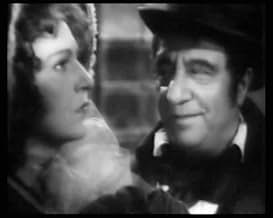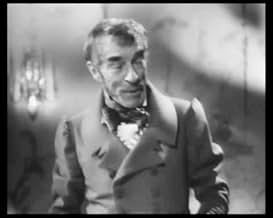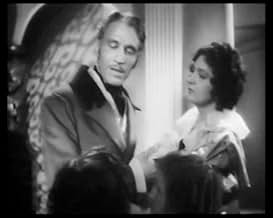NOTE IMDb
7,1/10
136
MA NOTE
Un colonel de l'Empire, laissé pour mort sur un champ de bataille, rentre à Paris et trouve sa femme remariée.Un colonel de l'Empire, laissé pour mort sur un champ de bataille, rentre à Paris et trouve sa femme remariée.Un colonel de l'Empire, laissé pour mort sur un champ de bataille, rentre à Paris et trouve sa femme remariée.
Marie Bell
- La comtesse Rosine Ferraud
- (as Marie Bell de la Comédie Française)
Aimé Clariond
- Maître Derville
- (as Aimé Clariond de la Comédie Française)
Pierre Alcover
- Le directeur de l'asile
- (as Alcover)
Jacques Charon
- Un clerc
- (as Jacques Charon de la Comédie Française)
Arlette Wherly
- La fille Ferraud
- (as Arlette Wehrli)
Pierre Brulé
- Le Fils Ferraud
- (as Pierre Brule)
Histoire
Le saviez-vous
- AnecdotesPierre Alcover's last film.
- Citations
Le colonel Jacinthe Chabert aka Jacinthe 'the beggar': The war is a terrible thing.
Delbecq: Yes, but someone has to defend the fatherland.
Le colonel Jacinthe Chabert aka Jacinthe 'the beggar': Monsieur, I am an old soldier and I think! After everything that I've seen, I shall say that the word "patriotism" means nothing against the word "humanism".
- ConnexionsRemade as Le colonel Chabert (1994)
Commentaire à la une
Adversity breeds creativity it has been said and this is certainly true of French film making under the German Occupation. Apart from a couple of exceptions over which it is wiser to pass in silence, the works of Honoré de Balzac fared especially well and this adaptation of his novella 'Le Colonel Chabert' is undeniably one of the finest.
The titular character is one of Balzac's most monumentally tragic and has been interpreted by such luminaries as Werner Krauss, Vladislav Strzhelchik, Gérard Depardieu and in René le Hénaff's film by Raimu, famously described by Orson Welles as 'the greatest actor of them all'.
After a disagreement beween Raimu and Jacques Becker, the film was assigned to Le Hénaff who was gifted a cast of the highest calibre and aided by editor Marguerite Renoir, cinematographer Robert Le Febvre, production designer Jacques Colombier and composer Louis Beydts, all of them superlative in their field. The result is both mesmerising and deeply unsettling.
The physically maimed and mentally damaged Chabert literally returns from the grave having been thought killed at the battle of Eylau, in the forlorn hope of being restored to his former wealth, status and to his wife Rosine but she has since married a Count and has two children. Faced with her indifference, stinginess and ignominious attempts to have him committed to an asylum, he is reduced to a life of beggary and ends his days in a poor house with other broken remnants of Napoleon's empire. He declines the chance of being rehabilitated, denies his rank and describes himself simply as 'number 107, room 4'.
Raimu's powerful presence and his ability to tug at the heartstrings are paramount here whilst one of her nation's eminent tragediennes Marie Bell excels in the difficult and emotionally complex role of Rosine. Sterling support by Aimé Clariond and Jacques Baumer whose characters respectively help and hinder Chabert's cause.
Le Hénaff was to direct Raimu in the bizarre 'Les Gueux au Paradis' whilst Raimu and Clariond were to appear to great effect in 'L'homme au Chapeau rond' which turned out to be Raimu's swansong. He has of course since been immortalised by having France's highest film award the 'César' named after his character in the 'Marseille trilogy'.
The pathos of the noble Chabert reduced to such dire straits which could be seen as a metaphor for a defeated France, must surely have struck a chord with audiences at the time as well as pleasing the Nazi regime whilst the theme of a hero of War becoming an outcast of Peace is timelessly relevant.
The titular character is one of Balzac's most monumentally tragic and has been interpreted by such luminaries as Werner Krauss, Vladislav Strzhelchik, Gérard Depardieu and in René le Hénaff's film by Raimu, famously described by Orson Welles as 'the greatest actor of them all'.
After a disagreement beween Raimu and Jacques Becker, the film was assigned to Le Hénaff who was gifted a cast of the highest calibre and aided by editor Marguerite Renoir, cinematographer Robert Le Febvre, production designer Jacques Colombier and composer Louis Beydts, all of them superlative in their field. The result is both mesmerising and deeply unsettling.
The physically maimed and mentally damaged Chabert literally returns from the grave having been thought killed at the battle of Eylau, in the forlorn hope of being restored to his former wealth, status and to his wife Rosine but she has since married a Count and has two children. Faced with her indifference, stinginess and ignominious attempts to have him committed to an asylum, he is reduced to a life of beggary and ends his days in a poor house with other broken remnants of Napoleon's empire. He declines the chance of being rehabilitated, denies his rank and describes himself simply as 'number 107, room 4'.
Raimu's powerful presence and his ability to tug at the heartstrings are paramount here whilst one of her nation's eminent tragediennes Marie Bell excels in the difficult and emotionally complex role of Rosine. Sterling support by Aimé Clariond and Jacques Baumer whose characters respectively help and hinder Chabert's cause.
Le Hénaff was to direct Raimu in the bizarre 'Les Gueux au Paradis' whilst Raimu and Clariond were to appear to great effect in 'L'homme au Chapeau rond' which turned out to be Raimu's swansong. He has of course since been immortalised by having France's highest film award the 'César' named after his character in the 'Marseille trilogy'.
The pathos of the noble Chabert reduced to such dire straits which could be seen as a metaphor for a defeated France, must surely have struck a chord with audiences at the time as well as pleasing the Nazi regime whilst the theme of a hero of War becoming an outcast of Peace is timelessly relevant.
- brogmiller
- 24 mars 2023
- Permalien
Meilleurs choix
Connectez-vous pour évaluer et suivre la liste de favoris afin de recevoir des recommandations personnalisées
Détails
- Date de sortie
- Pays d’origine
- Langue
- Aussi connu sous le nom de
- Pukovnik Šaber
- Lieux de tournage
- Société de production
- Voir plus de crédits d'entreprise sur IMDbPro
- Durée1 heure 42 minutes
- Couleur
- Mixage
- Rapport de forme
- 1.37 : 1
Contribuer à cette page
Suggérer une modification ou ajouter du contenu manquant

Lacune principale
By what name was Le Colonel Chabert (1943) officially released in Canada in English?
Répondre






















